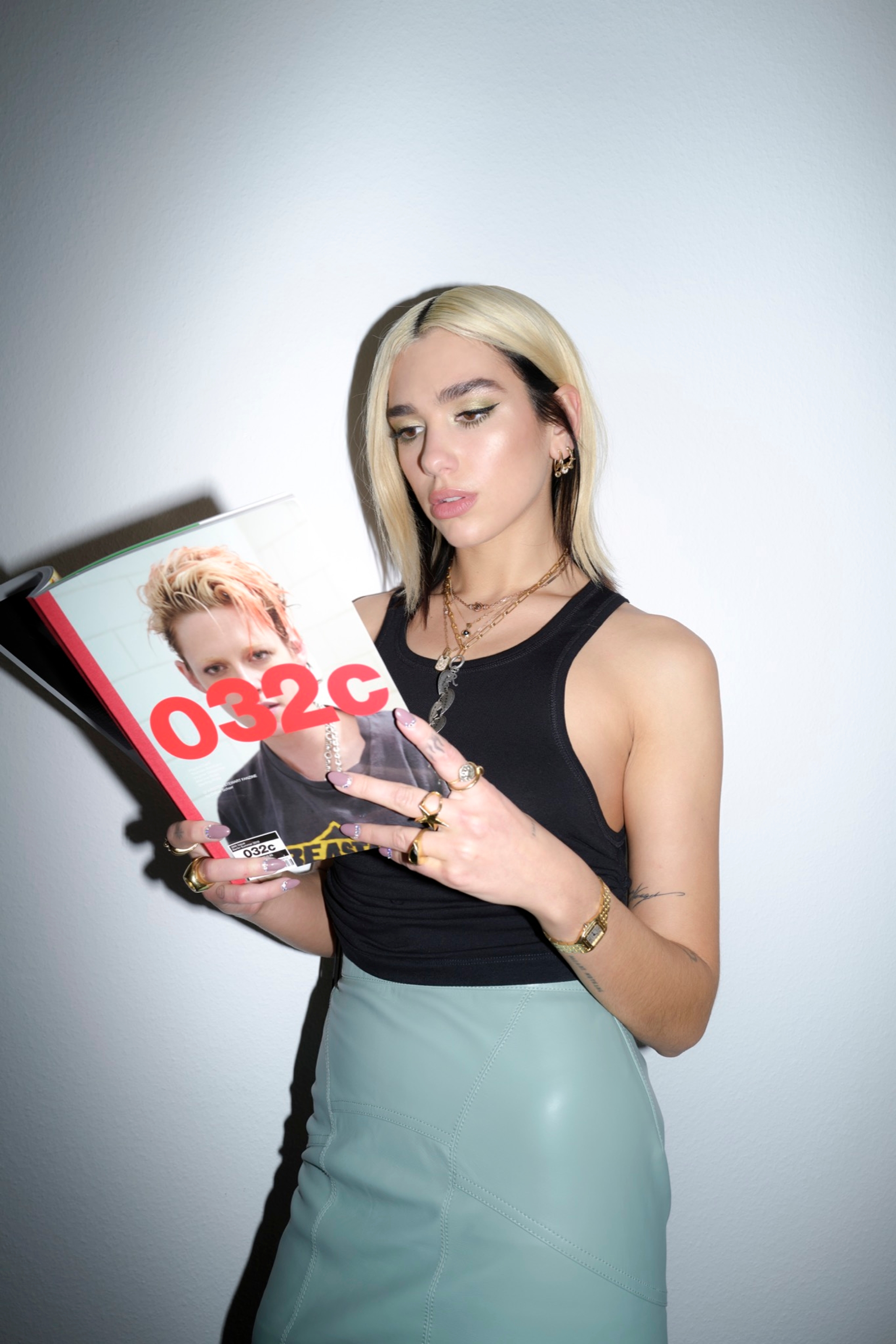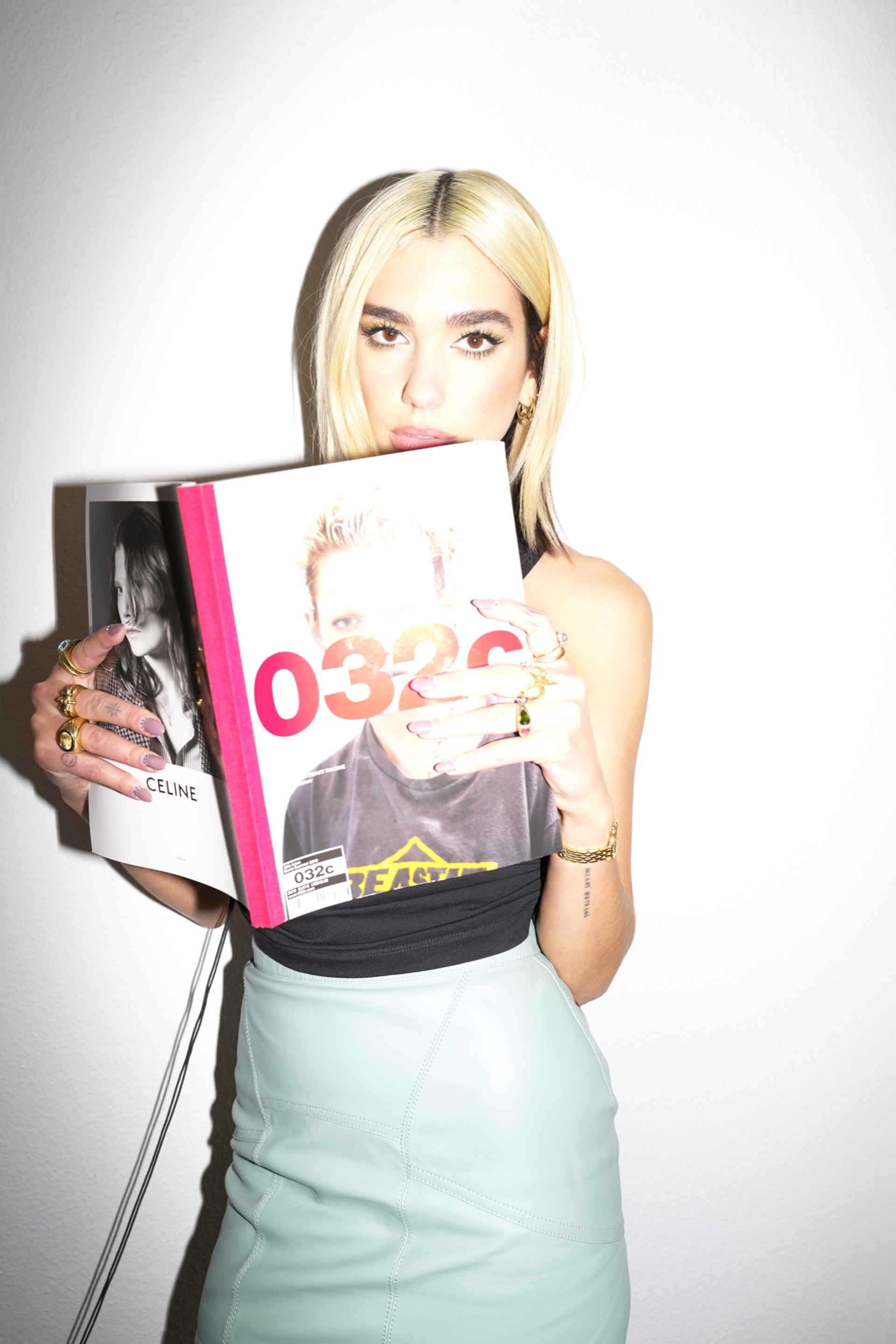Société de 032c presents Getting Started with DUA LIPA: London-born, Pristina-bred, Global Pop Phenomenon
Dua Lipa puts a bright spin on millennial ennui. In 2017, the release of her self-titled debut album established the singer as a pop powerhouse, with hits such as “New Rules” or “IDGAF” achieving anthem status – and Lipa, international stardom – in a matter of months. The London native describes her musical style as “dark pop,” an electronic euphoria infused with a kind of cynicism. Think Pink meets Lana del Rey – whose manager, Ben Mawson, stumbled upon a 17-year-old Lipa’s YouTube demos and decided to sign her. Now 24, Lipa has three Brit awards and two Grammys under her belt, plus an Yves Saint Laurent fragrance campaign and a capsule collection with the London-based denim brand Pepe Jeans. Conscious of not letting success morph into conceit, the self-professed workaholic has pursuits beyond the pop persona: committed to giving a voice and platform to the emerging artistic community of Kosovo, her family’s home country, she has launched both an annual festival and a foundation in Pristina, promoting creative expression of local youth. Lipa came through Berlin earlier this month to perform her new single, “Don’t Start Now,” on the season finale of The Voice of Germany. We caught up with her right before she hit the stage.
Irina Baconsky: You’re in Berlin promoting a single from your upcoming album. How have you changed since your first release?
Dua Lipa: This is still a pop record, although it touches on different sounds – it’s more nostalgic, it has some disco and 1980s influences. In the past few years, I learned so much about touring and recording, and I wanted this album to reflect that. It’s more instrumental; it incorporates all these things I learned. When I released my first record, I was figuring it all out, learning everything on the job. Now, I’m a lot more confident in my identity.
Fame hit you quite suddenly – you became a global star in just a couple of years. This sudden celebrity can be destabilizing for someone just starting out. How did you keep your head on your shoulders?
It all happened within a space of five years, but the beginning was crazy. I feel like once it went off, it just snowballed. I was strapped to a rocket that I had no control over. It was an amazing experience though, and my friends, family, and team kept me sane and grounded. I don’t surround myself with “yes” people, and I value honesty. The people around me are always real. They tell me straight up. If I’m ever feeling stressed, they always remind me of the reasons I’m doing things. If I ever need to take a break, they’re the first to tell me, “That’s exactly what you should do.”
You seem to be very work-focused. Do you ever find time to chill?
I do work a lot, and all of this work is completely self-inflicted! I’m addicted to my job, and I love being busy and being on the move. I’m the kind of person who can go 100 miles per hour, and be all over the place, but it’s important to know how to slow down sometimes. Whenever I need to relax, I go off social media for a few days, I read, I have my friends over and just watch a movie on my sofa.
Dua Lipa performs on The Voice of Germany, November 2019
Dua Lipa performs on The Voice of Germany, November 2019
You’re from London, but you also partly grew up in Kosovo, where your family is from. With this multicultural background and constant traveling, is there anywhere you feel truly at home?
Of course – maybe in multiple places. London is definitely home for me. It’s where I keep all my shit. Pristina is also home. We’ve always spoken Albanian at home, so I was always very aware of my roots, but when I moved to Kosovo, where I lived between the ages of 11 and 15, this bond became a lot stronger. Learning proper Albanian grammar, and becoming a local, made me see Kosovo as home.
How was that transition, from London to Kosovo?
It was great. I take any adventure in my stride, and the moment I moved was when I’d just finished year six, which in England is when people move to a different school anyway. Everyone was changing schools; I just moved to a different country. I had family in Kosovo that I hadn’t yet met, despite speaking to them on the phone or on Skype. I didn’t know what to expect, and what I came to value the most was the sense of community that there was in Kosovo, which was is very different from how people are in London. You would walk your friends home, everyone kind of knows everyone, there is a much smaller community environment which was very interesting to experience.
Do you still go back?
Yes, every year. Two years ago, my family and I started a three-day festival in Kosovo called Sunny Hill Festival, which brings together international and domestic artists. We also opened a foundation in Pristina, which we call an art and innovation center, that we’re renovating this year. The idea was to have a space in the city that would enable kids to express themselves creatively, because resources are quite limited in Kosovo. If you give people the tools to work on their craft, whether it’s presenting, making podcasts or music videos, or performing, they can go off and start creating on their own. So now I go back every year to do some work for the foundation, and also for the festival. It’s a good reason to go back home regularly.

